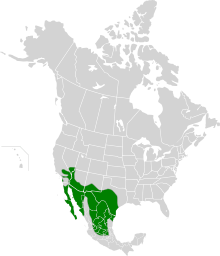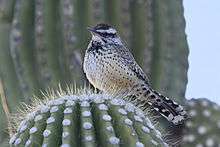Cactus wren
| Cactus wren | |
|---|---|
 | |
| Scientific classification | |
| Kingdom: | Animalia |
| Phylum: | Chordata |
| Class: | Aves |
| Order: | Passeriformes |
| Family: | Troglodytidae |
| Genus: | Campylorhynchus |
| Species: | C. brunneicapillus |
| Binomial name | |
| Campylorhynchus brunneicapillus Lafresnaye, 1835[2] | |
 | |
| Distribution map of the cactus wren. | |
The cactus wren (Campylorhynchus brunneicapillus) is a species of wren that is native to the southwestern United States southwards to central Mexico.
Diet
The cactus wren primarily eats insects, including ants, beetles, grasshoppers, and wasps. Occasionally, it will take seeds, fruits, small reptiles and frogs. Foraging begins late in the morning and is versatile; the cactus wren will search under leaves and ground litter and overturn objects in search of insects, as well as feeding in the foliage and branches of larger vegetation. Increasing temperatures cause a shift in foraging behavior to shady and cooler microclimates, and activity slows during hot afternoon temperatures. Almost all water is obtained from food, and free-standing water is rarely used even when found.
Habitat
It is a bird of arid regions, and is often found around yucca, mesquite or saguaro; it nests in cactus plants, sometimes in a hole in a saguaro, sometimes where its nest will be protected by the prickly cactus spines of a cholla or leaves of a yucca.
Behavior
The cactus wren forms permanent pair bonds, and the pairs defend a territory where they live all through the year.
In residential areas, cactus wrens are notorious for getting into mischief. Being curious birds, it is not uncommon for them to be found flying about out-of-place in automobiles where a window has been left open or it may even enter homes through an open door or window and find itself trapped.
State bird
The cactus wren is the state bird of Arizona.
Gallery
- Nesting in Desert Botanical Garden Phoenix, Arizona
 in Tucson
in Tucson in Sabino Canyon, Arizona
in Sabino Canyon, Arizona Juvenile, Phoenix
Juvenile, Phoenix
References
- ↑ BirdLife International (2012). "Campylorhynchus brunneicapillus". IUCN Red List of Threatened Species. Version 2013.2. International Union for Conservation of Nature. Retrieved 26 November 2013.
- ↑ "Campylorhynchus brunneicapillus". Integrated Taxonomic Information System. Retrieved 9 February 2006.
External links
| Wikimedia Commons has media related to Campylorhynchus brunneicapillus. |
| Wikispecies has information related to: Campylorhynchus brunneicapillus |
- Cactus Wren videos (Tree of Life)
- Cactus Wren videos on the Internet Bird Collection
- Stamps (for Mexico, United States) with RangeMap
- Cactus Wren photos VIREO
